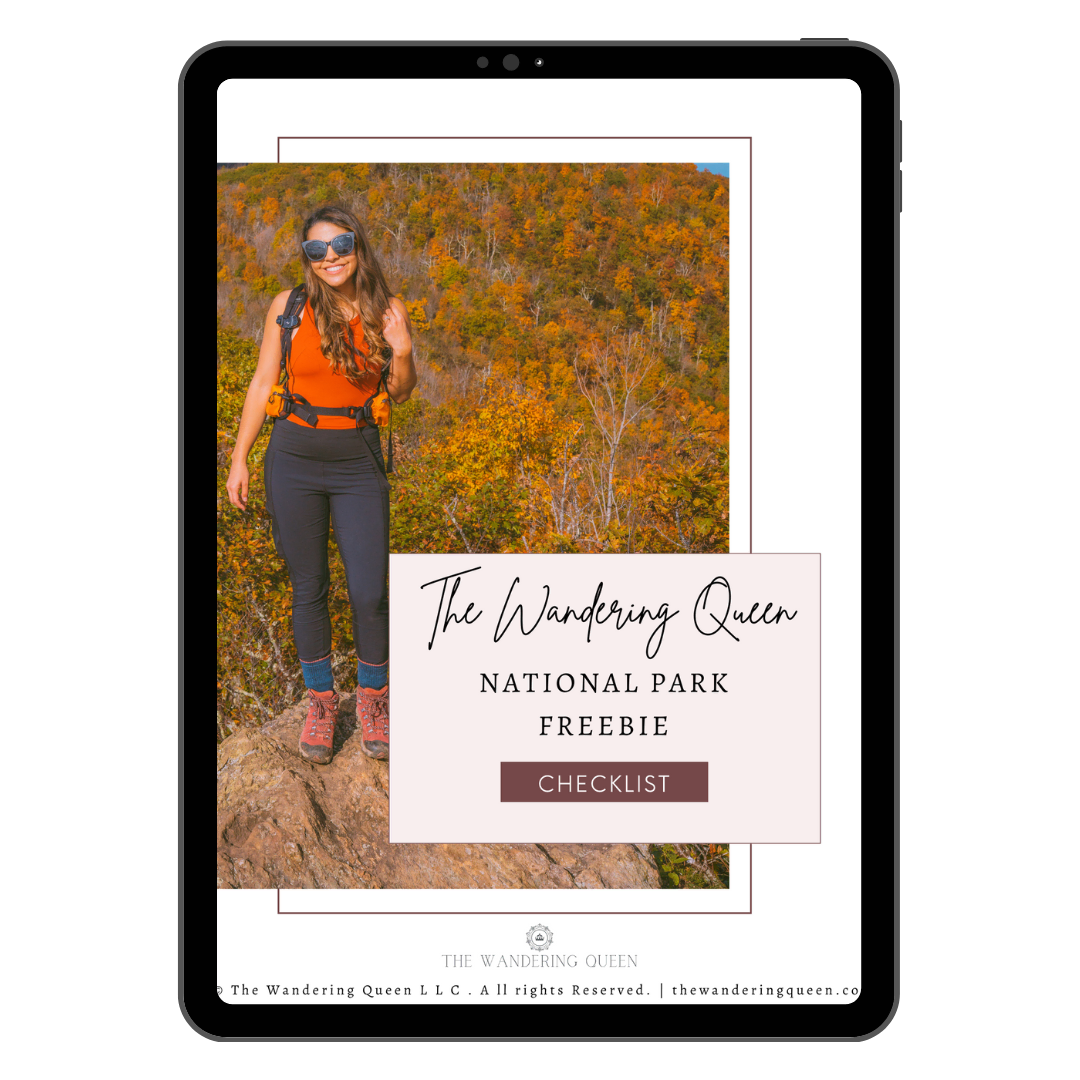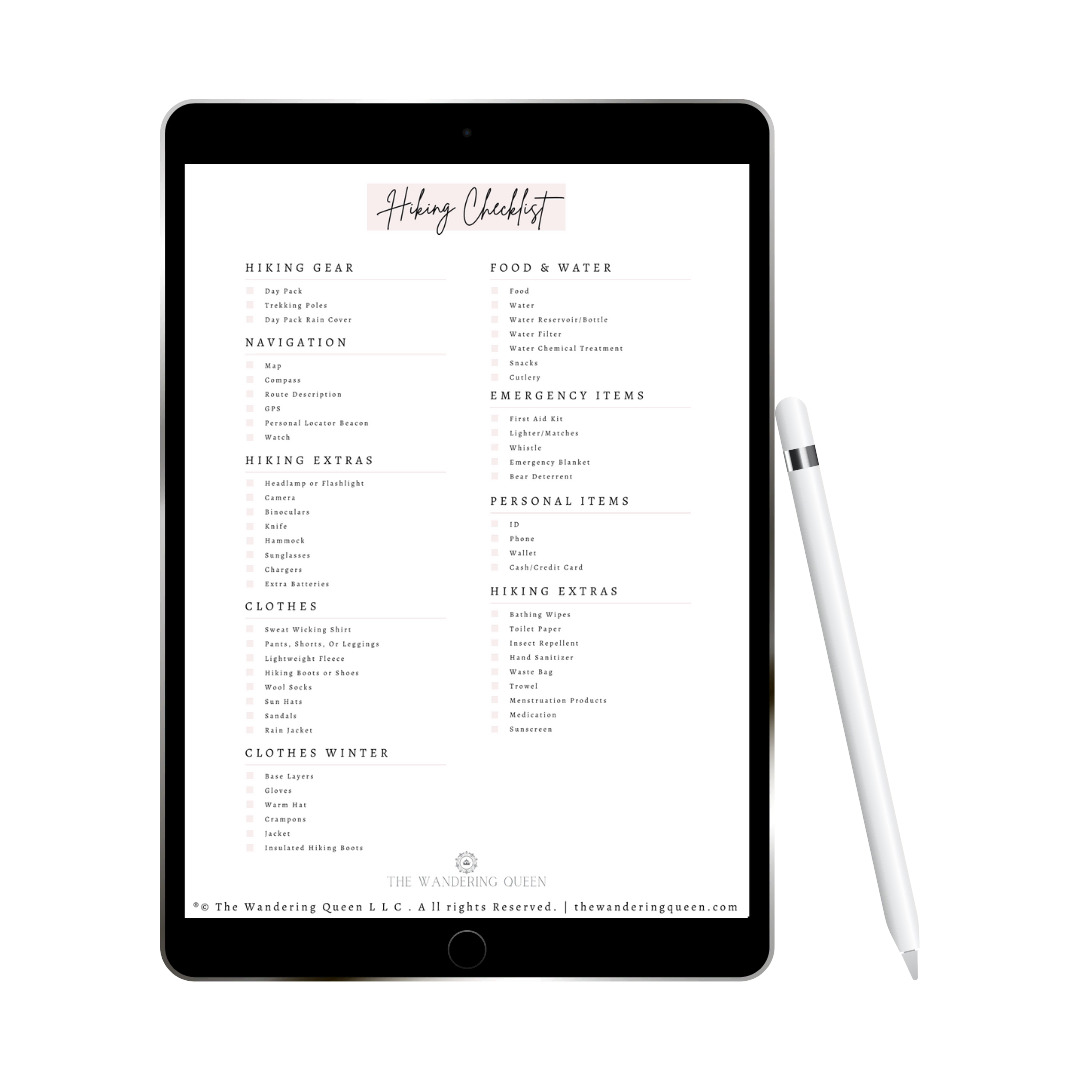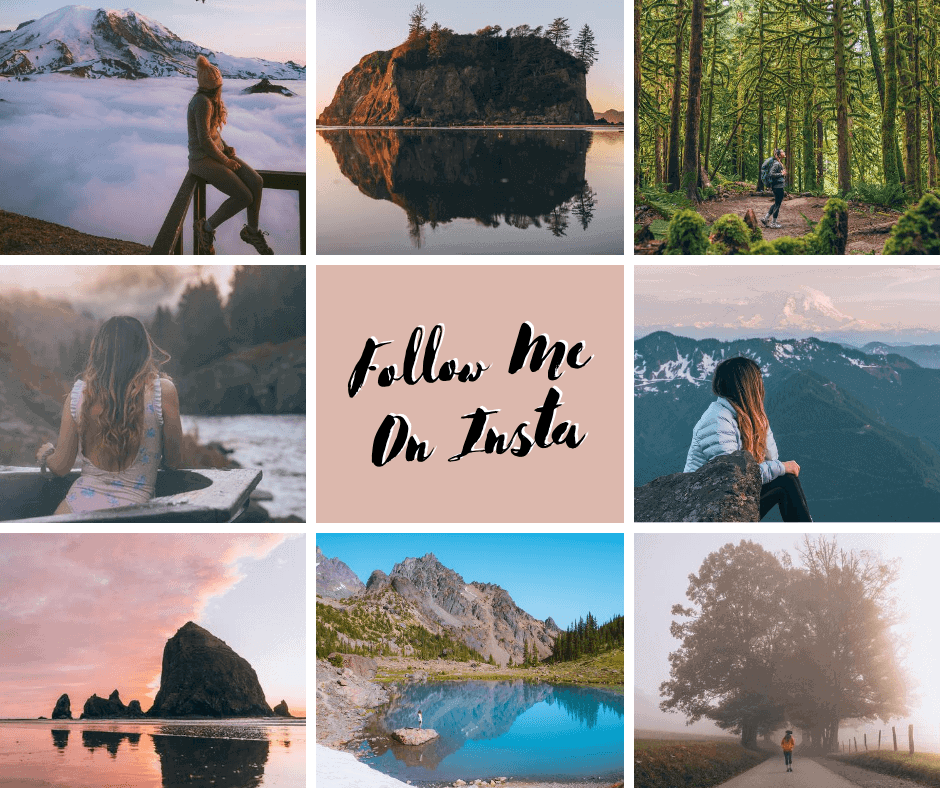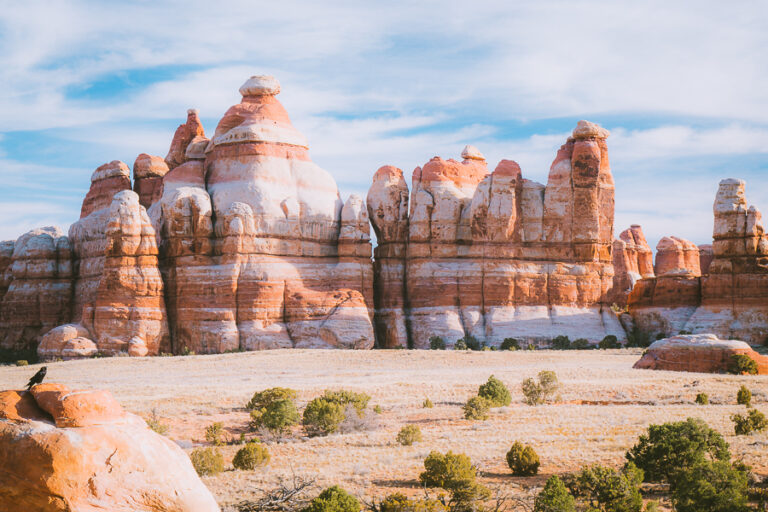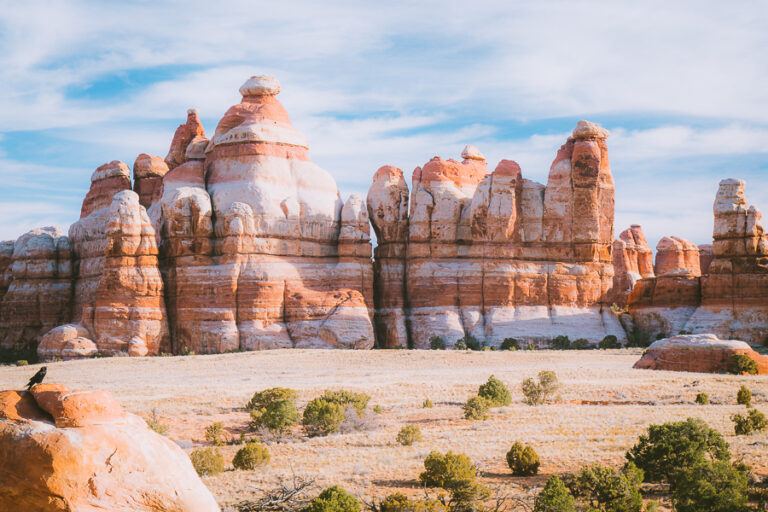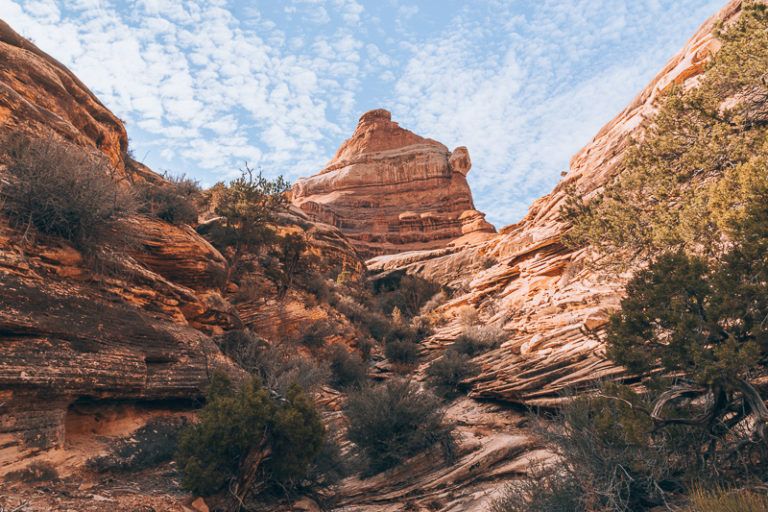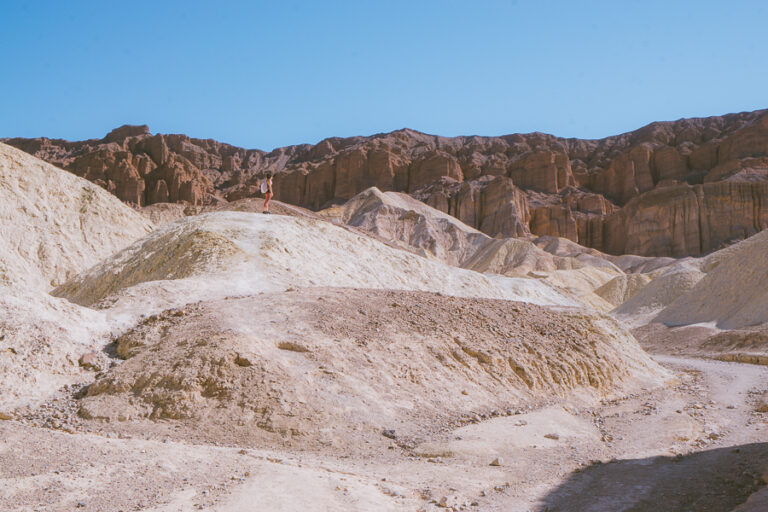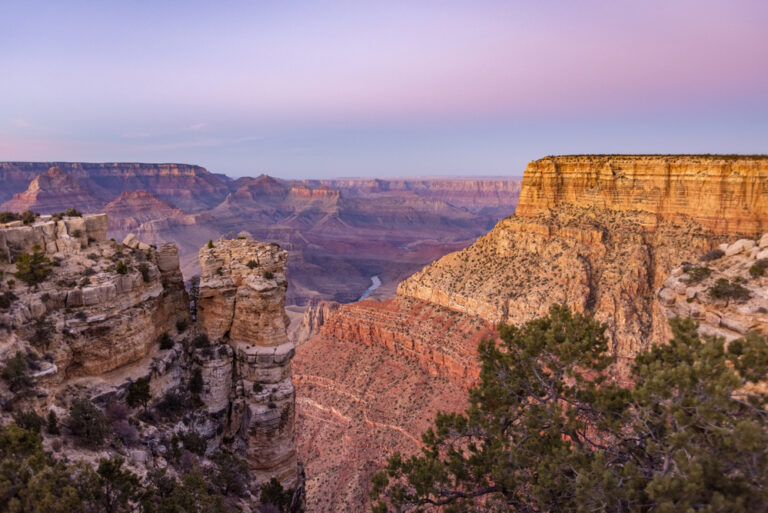The Perfect Olympic Peninsula Road Trip | Tips + Tricks
There are few places more captivating than Washington State’s Olympic Peninsula. With a rugged coastline, towering mountains, and lush rainforests, this gem pretty much has it all. The region is home to Olympic National Park, a UNESCO World Heritage Site, and beautifully showcases some of the Pacific Northwest’s most breathtaking natural splendor.
Need an unforgettable Olympic Peninsula road trip itinerary highlighting the best stops along the way? From the beautiful beaches to the moss-draped trees of the Hoh Rain forest and the dramatic coastal views at Cape Flattery, this journey is packed with jaw-dropping natural wonders.
You’ll also find insider tips on where to stay, how to prepare, and must-see spots you won’t want to miss. So buckle up and get ready to explore the magic of the Olympic Peninsula, which will have you back for more in no time.
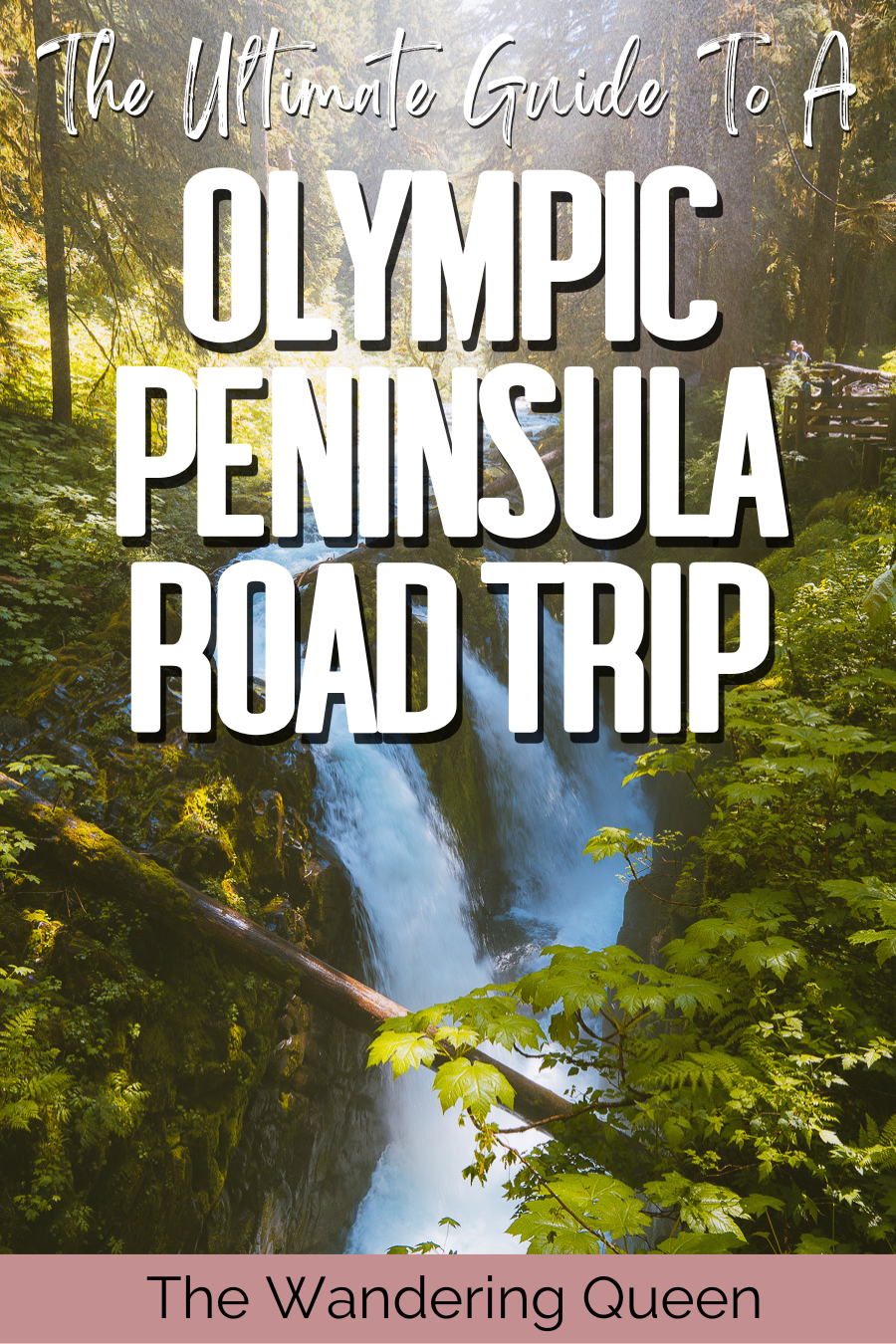
Disclosure: This post contains affiliate links. If you click one of them, I may receive a small commission (for which I am very grateful for) at no extra cost to you.
Olympic National Park
Related Posts
A Quick Note on My Washington Book
As a local, I’ve tried to explore all the hiking trails in The Evergreen State — including the stunning Olympic Peninsula. From insider tips based on personal experiences to in-depth guides, by Washington hiking ebook covers it all.
>>>Grab A Copy Of My eBook Here<<<
5-Day Olympic Peninsula Loop Itinerary
Craving the perfect mix of hiking, beautiful waterfalls, and wild beaches teeming with marine life? This 5-day itinerary has you covered. With each day packed full of jaw-dropping scenery, get ready for some seriously stunning hikes, photo ops, and cozy moments by the Pacific Ocean.
Day 1: Staircase Rapids, Mount Ellinor, and Lena Lake
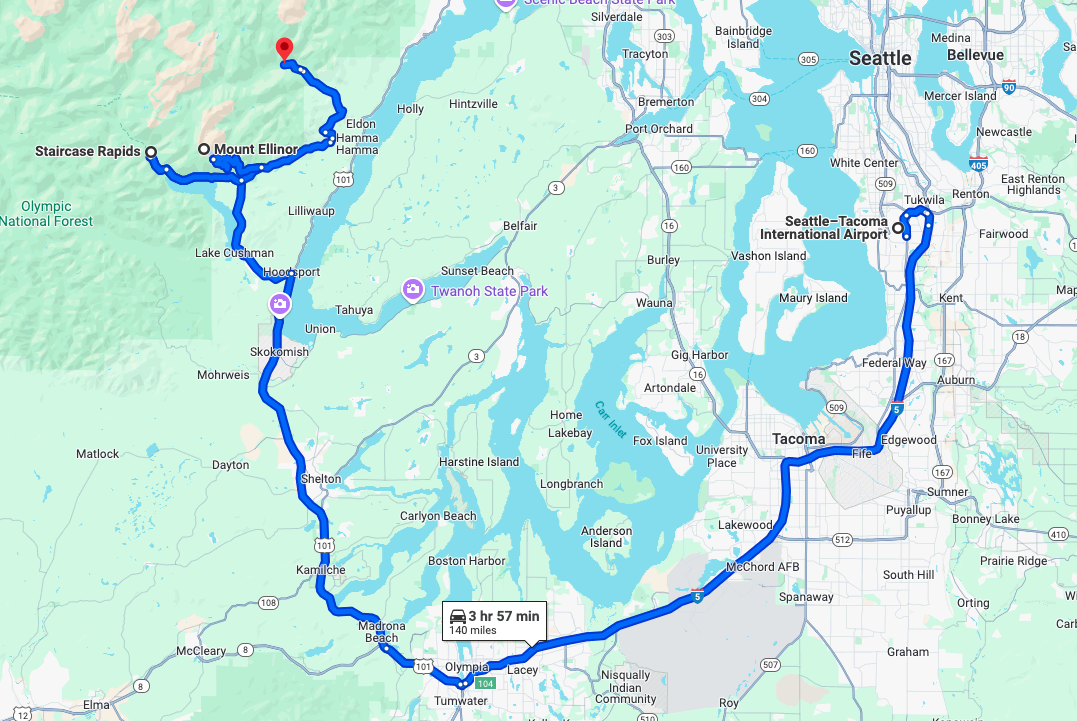
Start your trip off with a bang by exploring the southeast corner of Olympic National Park.
Staircase Rapids
- Length: 2.1 miles loop
- Elevation Gain: 213 feet
- Difficulty: Easy
- Trail Guide: Link
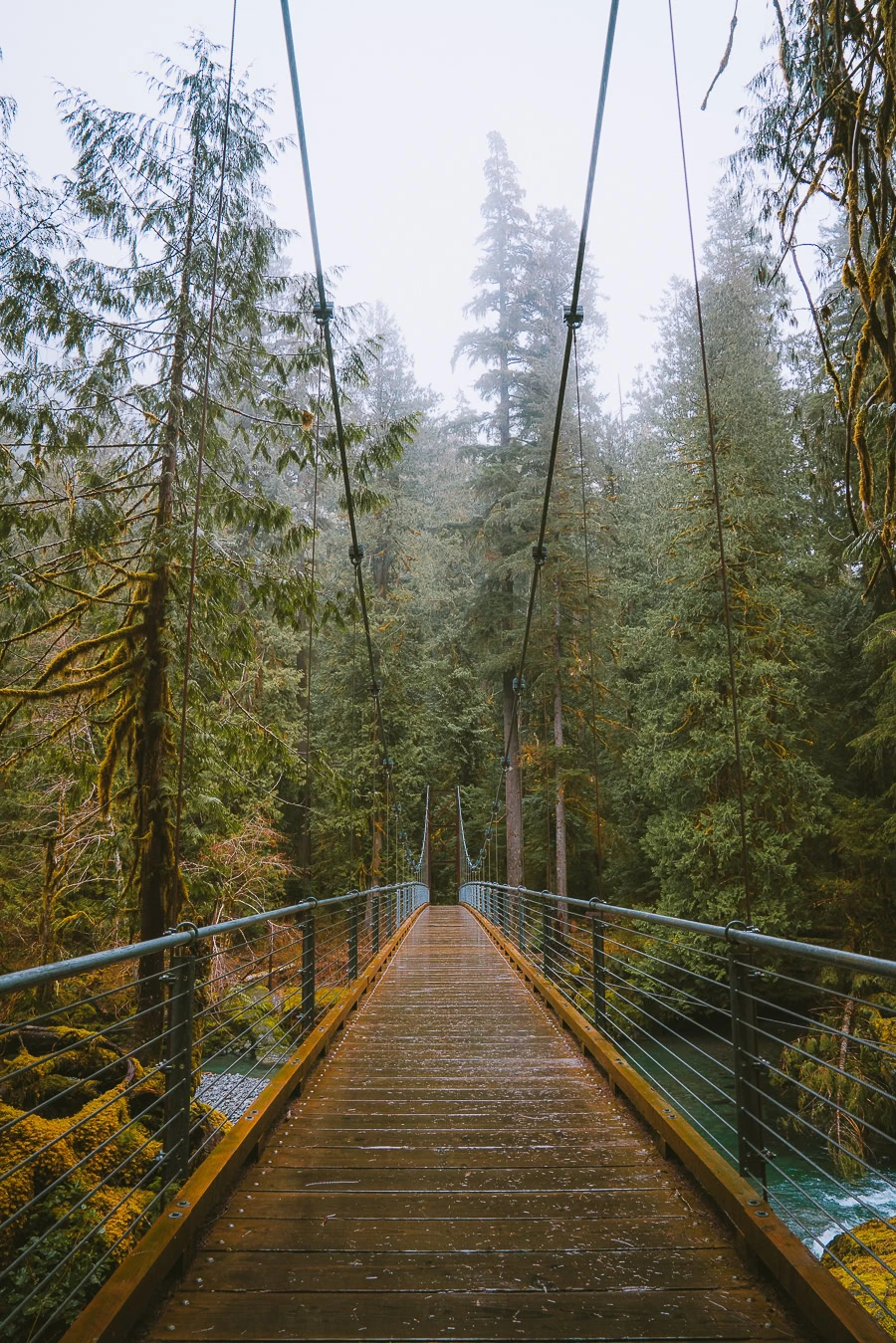
Staircase Rapids is located in the Staircase region of the park near Lake Cushman. This 2-mile loop is a perfect warm-up for the adventures to come. You’ll walk along the North Fork Skokomish River, where you’ll be treated to crystal-clear waters, moss-draped trees, and the soft sounds of the forest.
The hike is relatively easy, making it a great way to get in tune with the beauty of the peninsula without feeling rushed.

Tip: The early morning light filtering through the forest is magical for photos, so aim for a morning start. Don’t worry; this won’t take up your entire morning!
Mount Ellinor
- Length: 5.9 miles out & back
- Elevation Gain: 3,415 feet
- Difficulty: Hard
- Trail Guide: Link

Next up is Mount Ellinor, which offers a bit more of a challenge. This hike comes with two trailhead options: lower (6.2 miles round trip) or upper (3.2 miles round trip). Regardless of which you choose, the views from the top are worth every step.
On a clear day, you’ll be rewarded with panoramic views of the Olympic Mountains, Puget Sound, and even Mount Rainier in the distance. This hike involves steep sections and a significant elevation gain (2,444 feet from the upper trailhead), but if you’re prepared for a heart-pumping trek, the scenery is unbeatable.
All the best views in the state
100+ WA Hikes
Embark on Washington’s best trails with our eBook! Inside, find top hikes, expert tips, and stunning views, making every adventure unforgettable. Dive into the beauty of Washington’s outdoors now!
Lena Lake
- Length: 6.2 miles out & back
- Elevation Gain: 1532 feet
- Difficulty: Moderate
- Trail Guide: Link
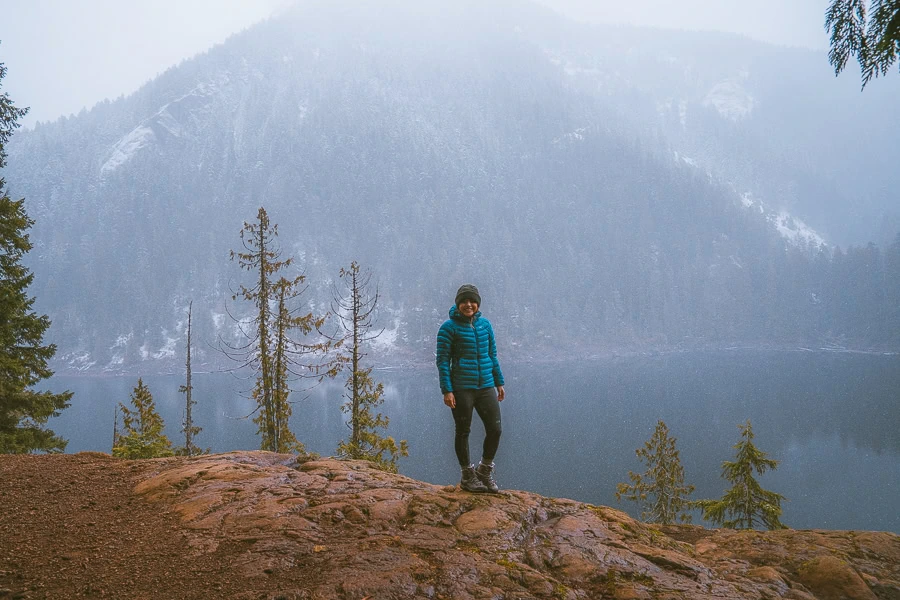
After a tough hike, Lena Lake is the perfect place to wind down your day. This round-trip trail (with an optional extension to Upper Lena Lake) features serene lake views, towering fir trees, and plenty of peaceful spots to rest. It’s a moderate hike, but the reward of relaxing by the lake is just what you’ll need after tackling Mount Ellinor.
Day 2: Mount Townsend
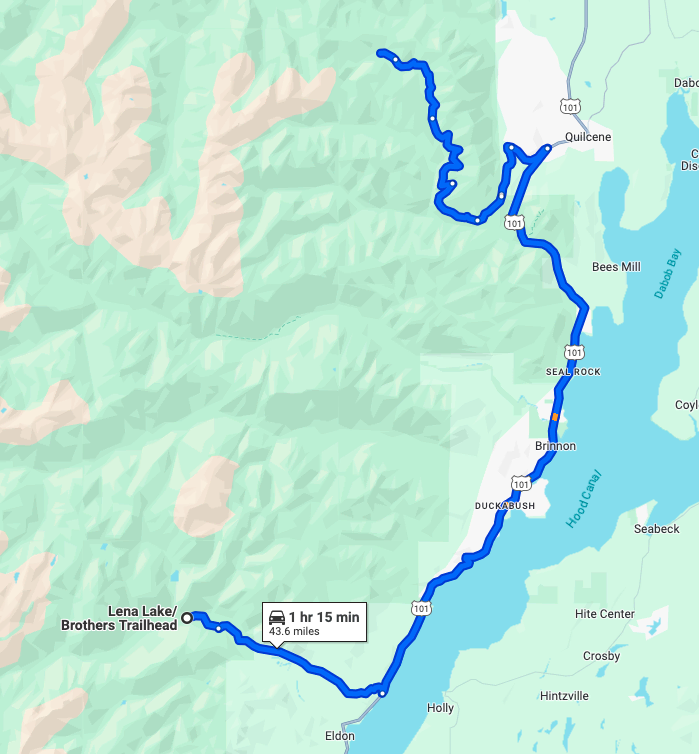
Spend the day exploring Mount Townsend
Mount Townsend
- Length: 8.5 miles out & back
- Elevation Gain: 2,982 feet
- Difficulty: Hard
- Trail Guide: Link
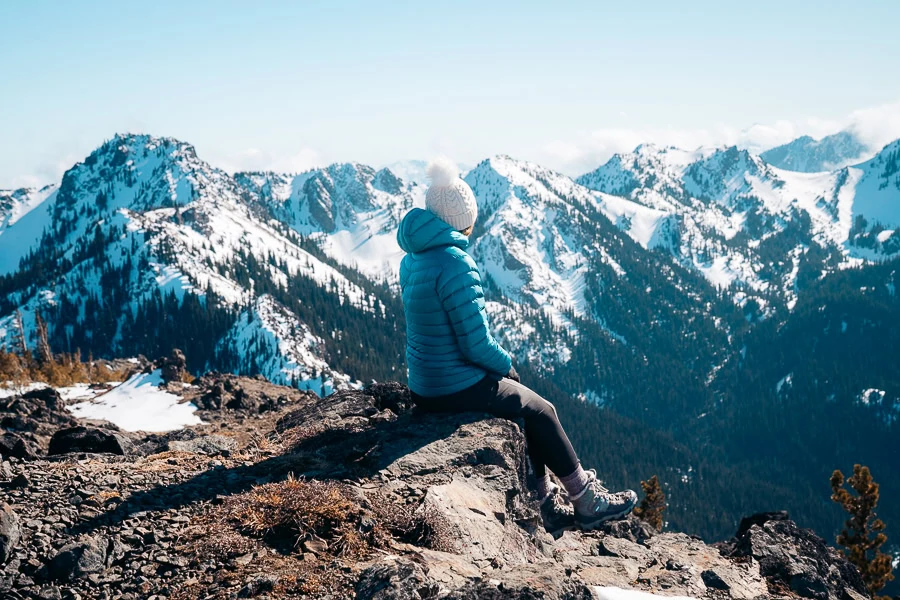
Today is all about Mount Townsend, one of the Olympic Peninsula’s hidden gems for hikers. This trek offers some of the best views in the area without the intense crowds you might find on other trails.
With an elevation gain of 2,982 feet, you’ll be treated to expansive views of the Olympic Mountains, the Cascades, and even the Strait of Juan de Fuca as you ascend. The trail passes through old growth forests before opening up to alpine meadows in the final stretch.
If you’re visiting in the summer, expect vibrant wildflowers that will make you feel like you’re walking through a painting. The summit offers plenty of spots to sit, enjoy a packed lunch, and take in the panoramic views that stretch for miles.
Day 3: Hurricane Hill and Sol Duc Falls
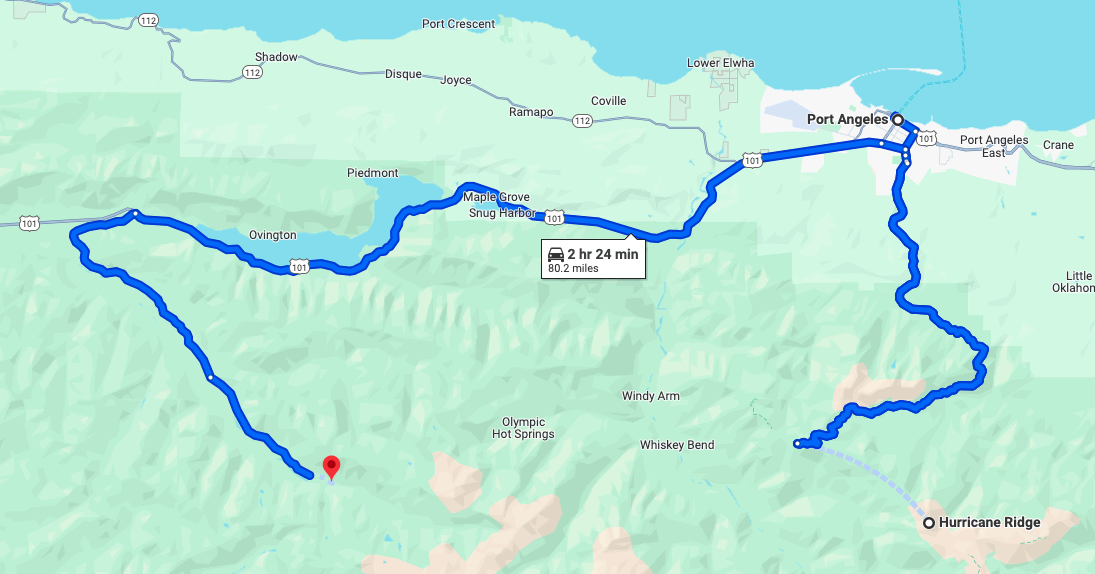
Today is filled with the beauty of the Olympic Peninsula. Are you ready?
Hurricane Hill
- Length: 3.4 miles out & back
- Elevation Gain: 826 feet
- Difficulty: Moderate
- Trail Guide: Link
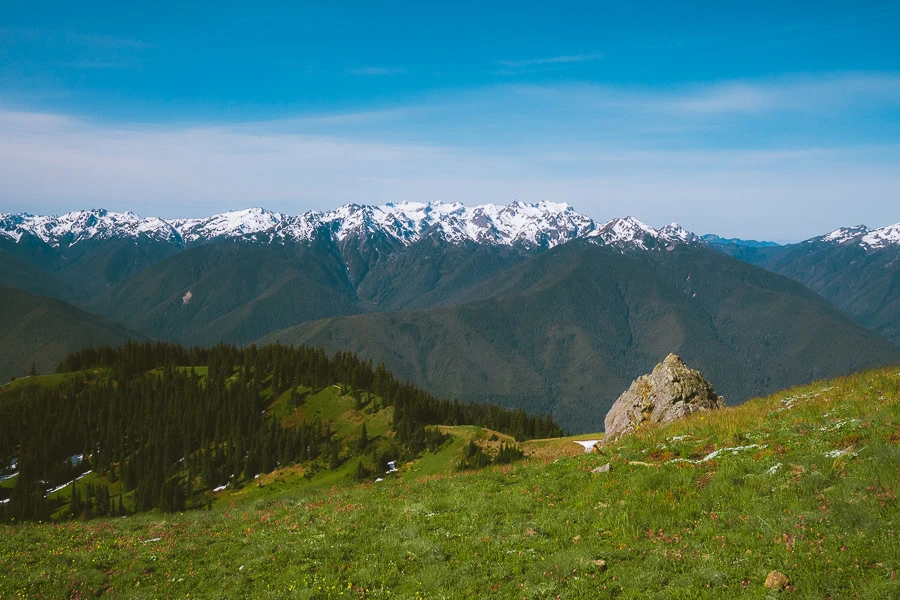
Get ready for breathtaking vistas on Hurricane Hill. This hike is relatively short but packs in big views, making it perfect for a relaxed morning adventure. The trailhead is situated near the Hurricane Ridge Visitor Center on Hurricane Ridge Road.
The trail climbs gently through meadows and offers sweeping views of the rugged Olympic Mountains, the Strait of Juan de Fuca, and even Vancouver Island on clear days. Here, you can experience the high alpine landscape without too much exertion, and the wildflowers in summer are truly stunning.
Sol Duc Falls
- Length: 1.8 miles out & back
- Elevation Gain: 259 feet
- Difficulty: Easy
- Trail Guide: Link
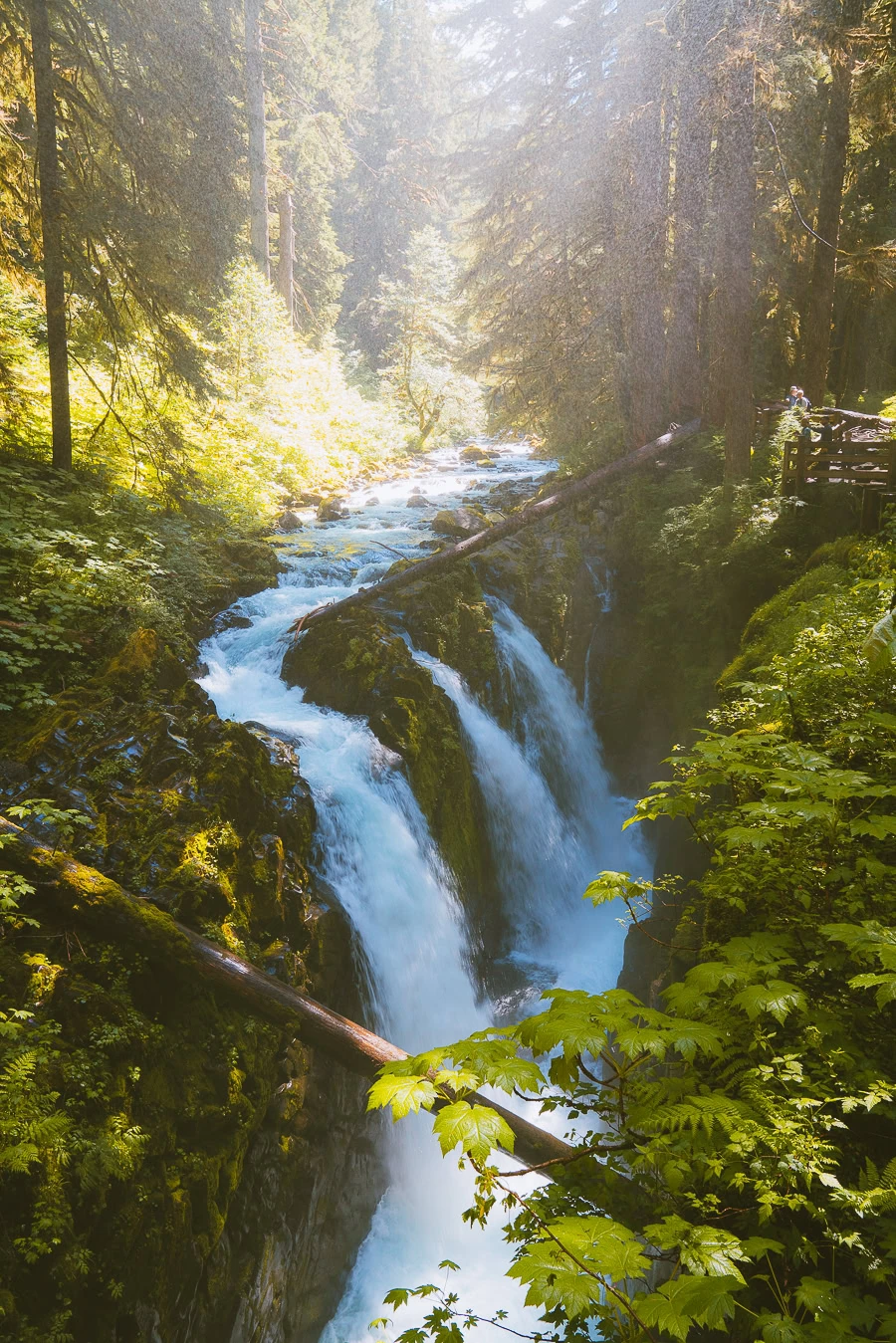
After Hurricane Hill, head to the lush Sol Duc Valley for an afternoon of waterfall chasing. Sol Duc Falls is a short, easy hike that takes you through a mossy rainforest to one of the national park’s most beautiful falls along the Sol Duc River. The water thunders over the rocks, splitting into multiple streams as it cascades into a gorge below.

Tip: If you have time, treat yourself to a soak in the nearby Sol Duc Hot Springs Resort. The warm, mineral-rich waters are the absolute perfect way to relax after a day of hiking.
Day 4: Mount Storm King, Marymere Falls, and Lake Crescent

Those boots had better be made for walking because today, you’ll tackle a whopper.
Mount Storm King
- Length: 4.1 miles out & back
- Elevation Gain: 2,106 feet
- Difficulty: Hard
- Trail Guide: Link
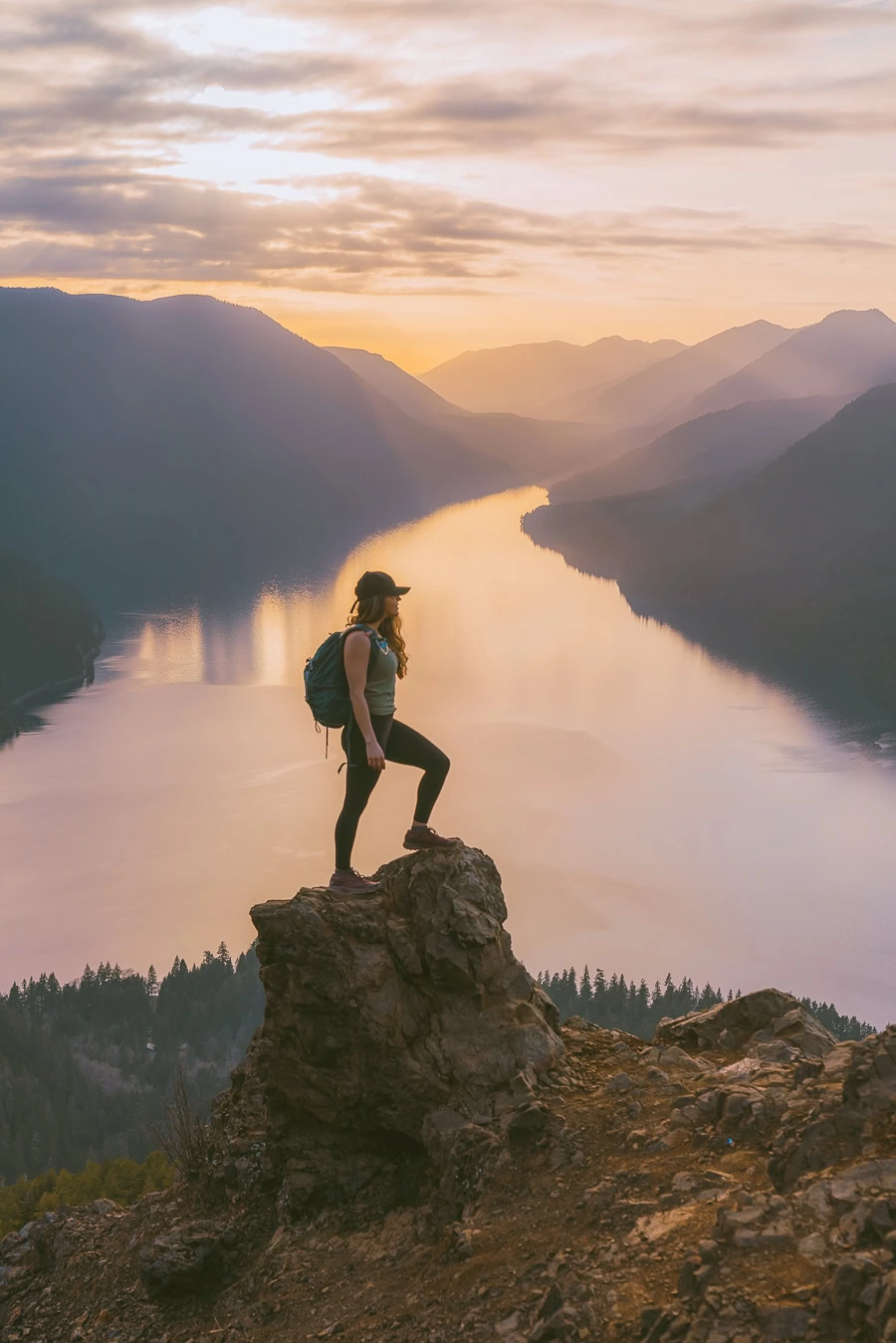
This is one of the most popular and challenging trails in the Lake Crescent area. The trail is only 4.1 miles round trip, but don’t be fooled by its short distance — this hike is steep! With an elevation gain of 2,165 feet, you’ll be huffing and puffing your way up, but the view from the top is absolutely worth it.
From the summit, you’ll enjoy jaw-dropping views of the entire lake below, with its deep blue waters stretching out against a backdrop of towering mountains.

Note: Be cautious near the summit — there are some rope-assisted sections that can be tricky, especially on wet days.
Marymere Falls
- Length: 2.1 miles out & back
- Elevation Gain: 377 feet
- Difficulty: Easy
- Trail Guide: Link
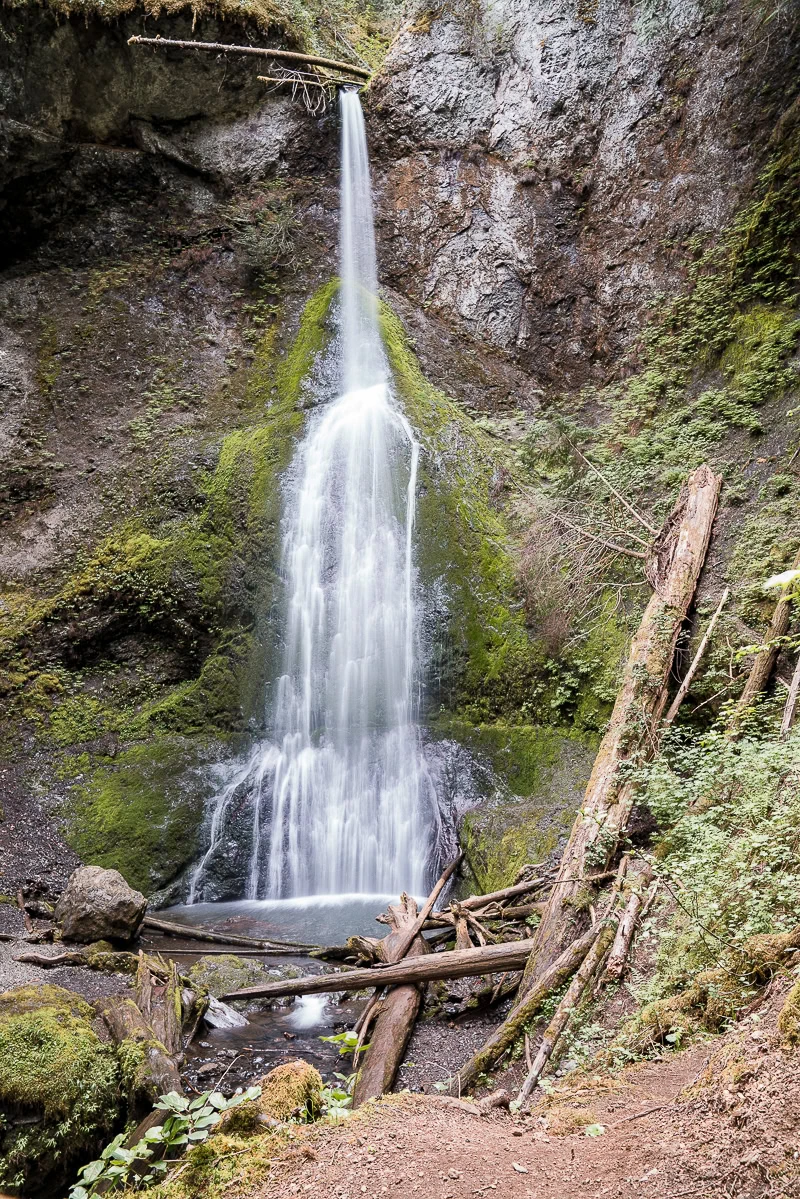
Once you’ve tackled the big trek, reward yourself with a more relaxing hike to Marymere Falls. Starting at Lake Crescent Lodge, the Marymere Falls trail meanders through an old growth forest before revealing a beautiful 90-foot waterfall. It’s an excellent spot to snap some photos or just enjoy the calming sounds of the water as it tumbles down the rocks.
Read More: 25 Best Hikes in the Pacific Northwest + Packing List & Tips
Lake Crescent
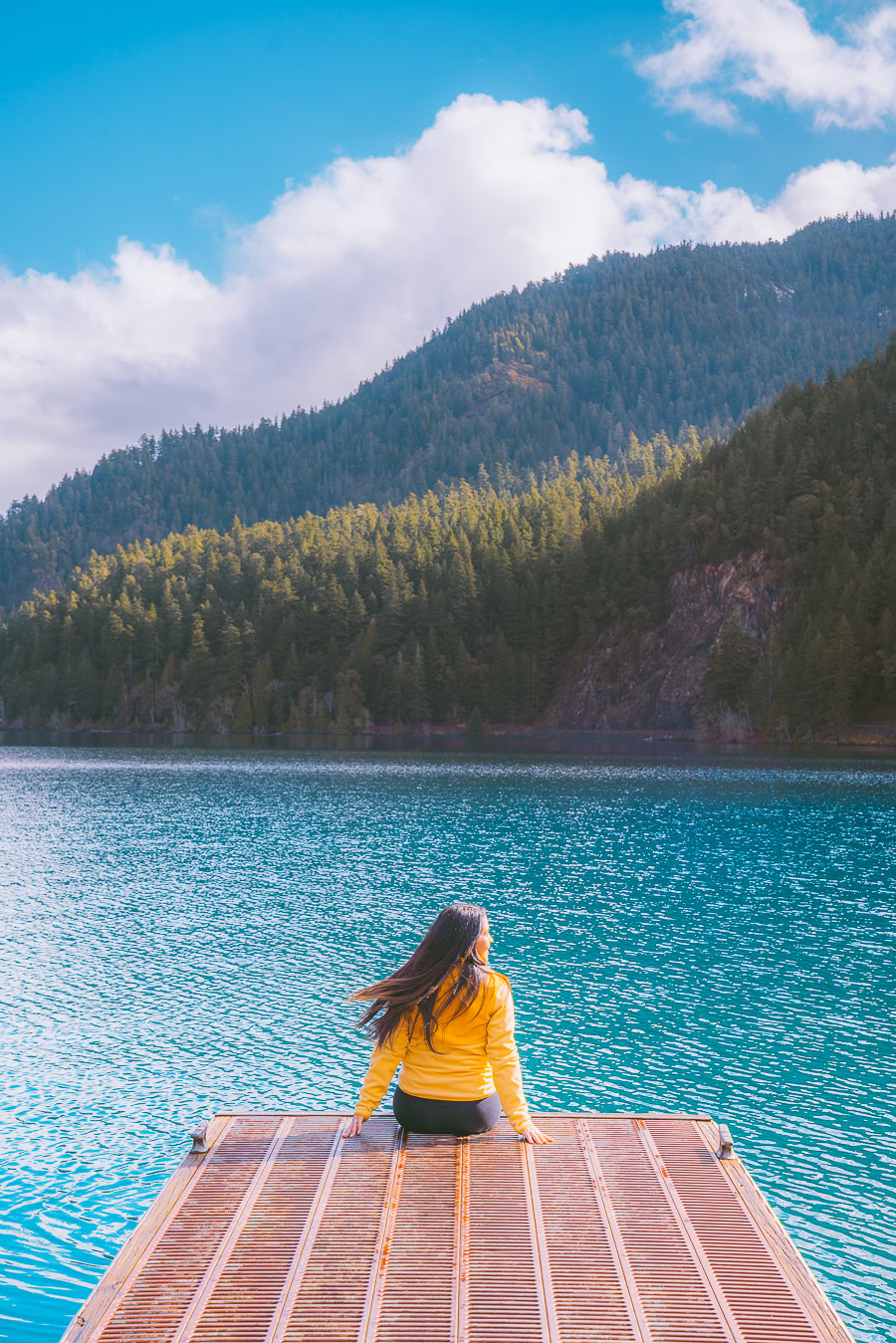
End your day with a peaceful stroll around Lake Crescent. You can explore the lakeshore or even rent a kayak if you feel like getting out on the water. The lake’s pristine waters are known for their vibrant turquoise color, which looks especially magical during the late afternoon golden hour.
Download my free Outdoor Photography Guide
Day 5: Cape Flattery, Rialto Beach, Second Beach, Hoh Rainforest, Ruby Beach, and Lake Quinault

Your final day is all about beach trips and the rainforest — two of the Olympic Peninsula’s most iconic features. This is a long day so I would remove Lake Quinault, and Cape Flattery if you run out of time.
Cape Flattery
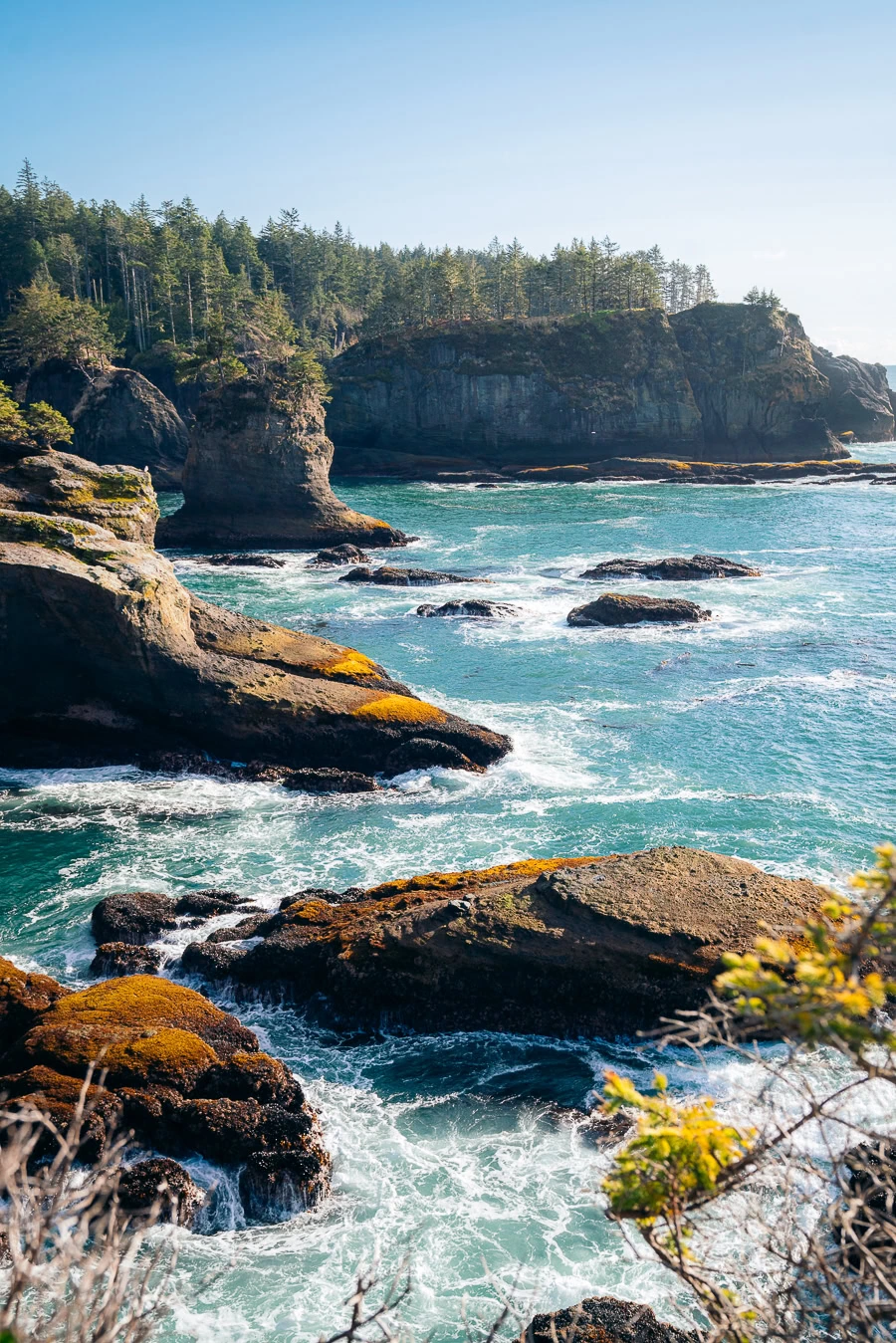
Start the day with a drive to the northwest corner of the contiguous U.S., Cape Flattery. The short trail leads you through the coastal forest to stunning views of sea stacks, caves, and the crashing waves of the Pacific Ocean. This is an excellent spot for wildlife viewing, so keep an eye out for puffins, seals, and even whales in the distance.
Rialto Beach & Second Beach
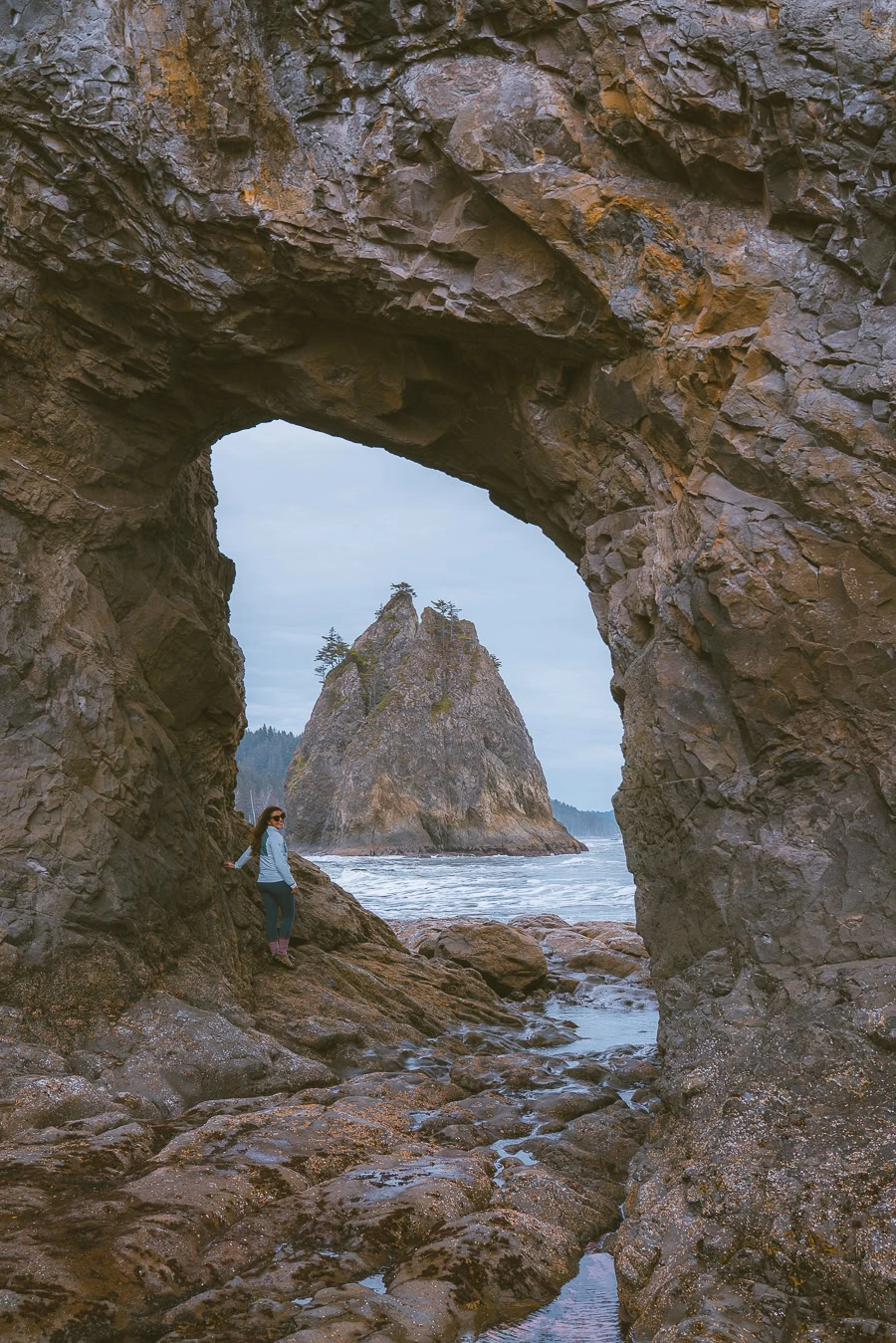
Famous for its dramatic sea stacks and driftwood-strewn coastline, Rialto Beach is a must-see. If you’re feeling adventurous, hike to Hole-in-the-Wall, a natural rock arch a few miles from the parking lot. Tide pooling here is fantastic at low tide, so plan accordingly.
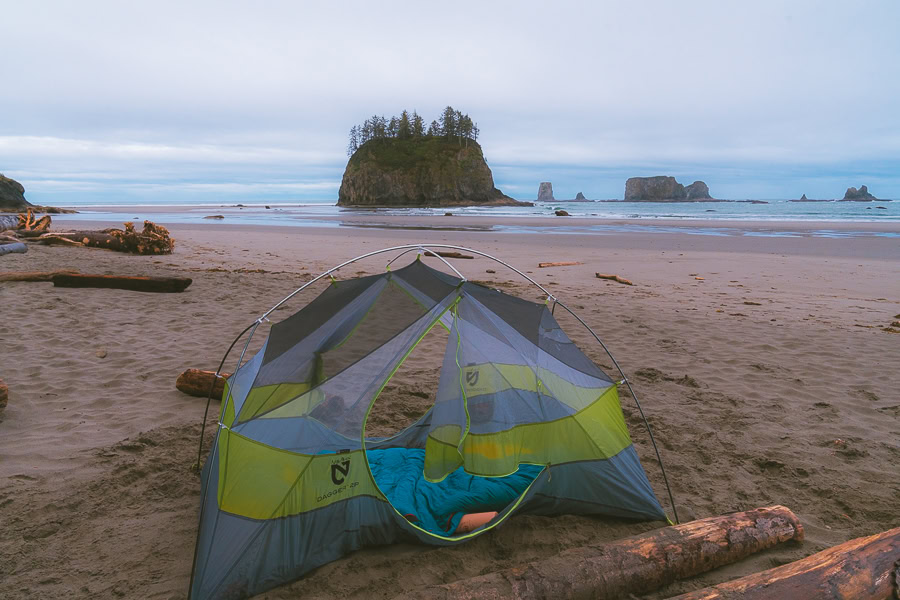
Nearby Second Beach is also worth the visit. One of the three famed La Push beaches, you can hike through the coastal forest to a secluded beach with impressive sea stacks and crashing waves — a photographer’s dream.

PS: If you have time, check out First Beach and Third Beach, too; they’re gorgeous.
Hoh Rainforest
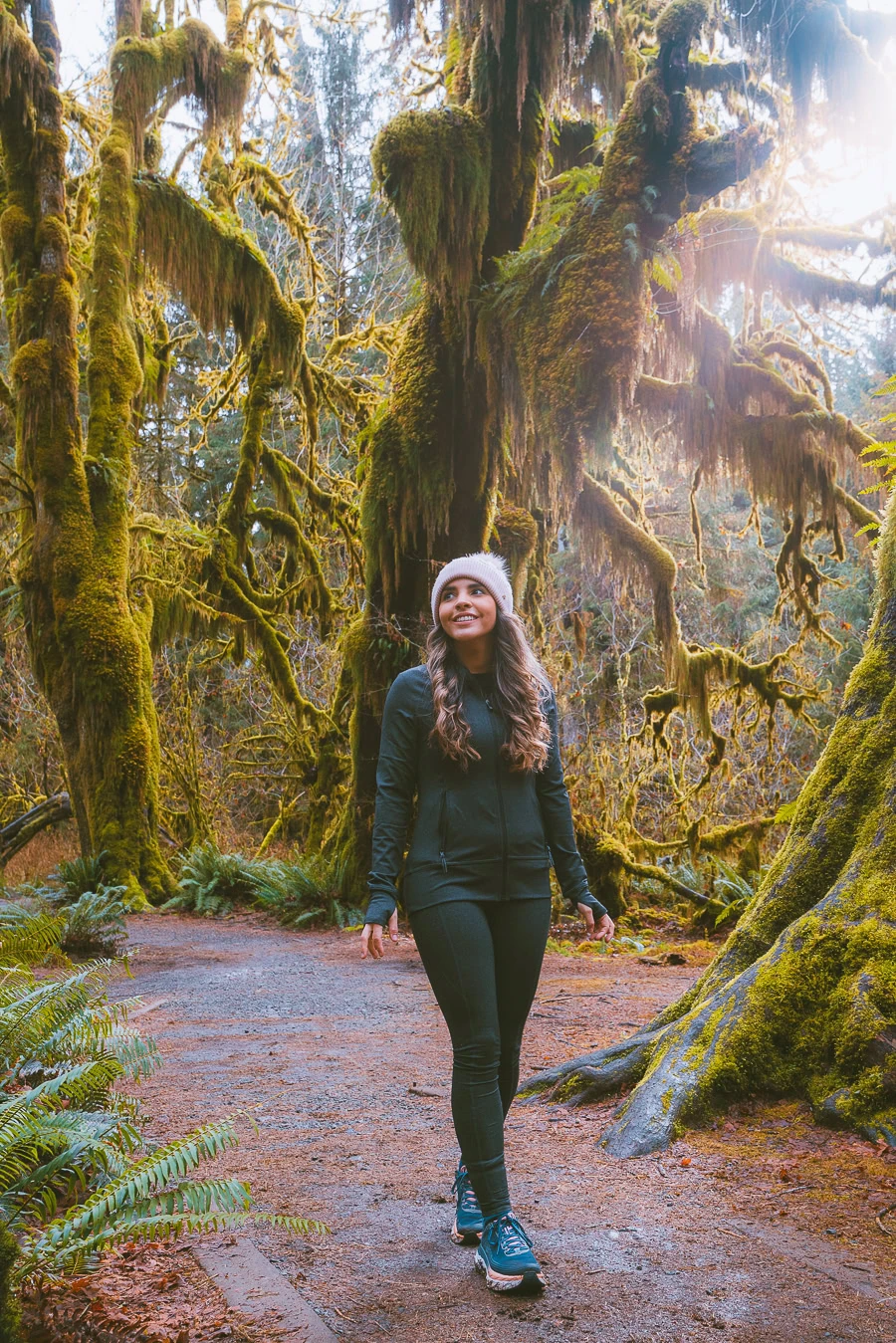
From the coast, make your way to the Hoh Rainforest, one of the largest temperate rainforests in the U.S. Take the Hall of Mosses trail for a short but enchanting walk through a forest draped in lush, green mosses. The towering trees, ferns, and thick undergrowth make you feel like you’ve stepped into another world.

Ruby Beach
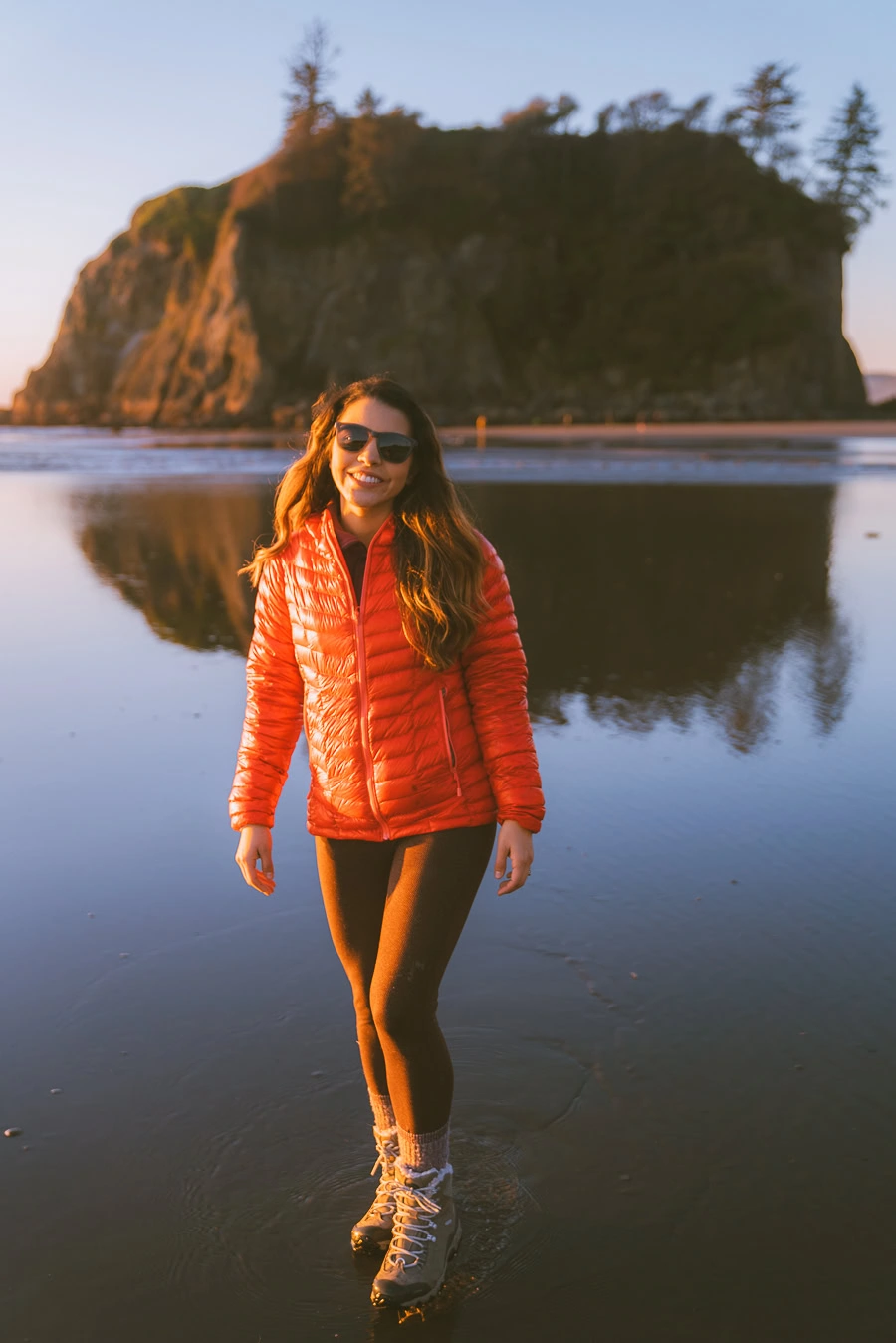
As you head south, stop by Olympic National Park’s Ruby Beach, known for its reddish sand and striking sea stacks. The beach is often misty, adding an ethereal quality to the rugged scenery. This is a great spot to sit, take in the ocean, and reflect on your incredible journey through the peninsula.
Lake Quinault
End your trip with a visit to Lake Quinault, nestled in the Quinault Rainforest. You can explore the short-loop trails around the lake or simply relax at the water’s edge, soaking in the beauty of the surrounding forest and mountains. It’s a peaceful, fitting end to your Olympic Peninsula adventure.
Other Olympic Peninsula Itineraries
If you only have a few days to spare, here are a few options for a multi day itinerary and a day trip plan.
3-Day Olympic Peninsula Itinerary
Head out for the perfect long weekend adventure on an Olympic Peninsula road trip.
Day 1: Southeast Olympic National Park & Mount Townsend
- Staircase Rapids Loop
- Mount Ellinor
- Mount Townsend( day-hike)
Day 2: Hurricane Hill, Sol Duc Falls, and Lake Crescent
- Hurricane Hill
- Sol Duc Falls
- Marymere Falls
- Lake Crescent
- Mount Storm King (day-hike)
Day 3: Cape Flattery, Beaches, Hoh Rainforest, and Ruby Beach
- Cape Flattery
- Rialto Beach & Hole-in-the-Wall
- Hoh Rainforest & Hall of Mosses
- Ruby Beach
- Lake Quinault
2-Day Olympic Peninsula Itinerary
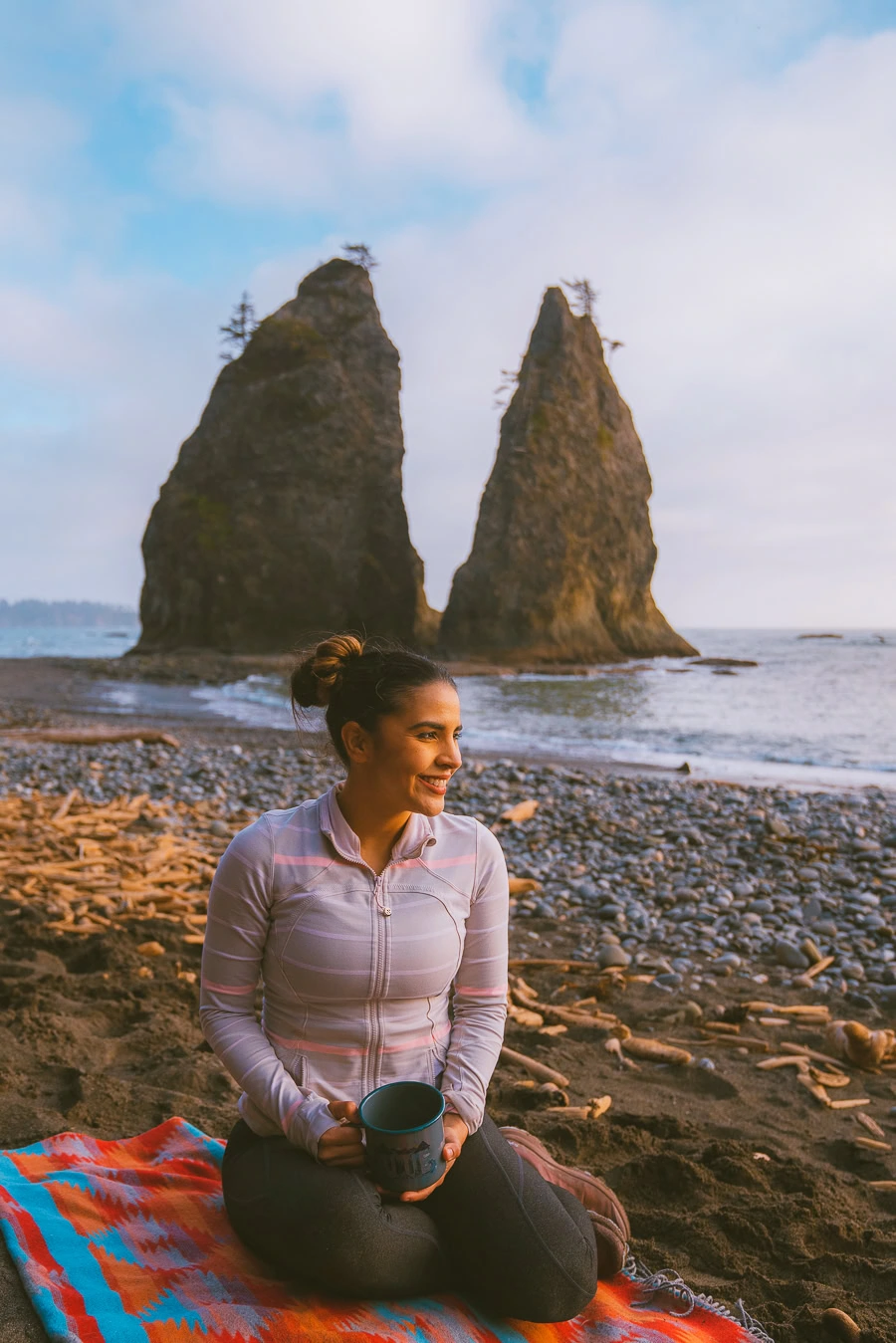
Need a weekend outing? This is a great trip if you need some green air.
Day 1: Hurricane Hill, Sol Duc Falls, and Lake Crescent
- Hurricane Hill
- Sol Duc Falls
- Marymere Falls
- Lake Crescent
Day 2: Cape Flattery, Rialto Beach, Hoh Rainforest, and Ruby Beach
- Cape Flattery
- Rialto Beach & Hole-in-the-Wall
- Hoh Rainforest & Hall of Mosses
- Ruby Beach
- Lake Quinault
Olympic Peninsula Day Trip Itinerary
If you only have one day to explore the Olympic Peninsula, focus on the highlights that showcase the best of its rainforests, coastal beauty, and easy-access hikes.
- Hurricane Hill
- Lake Crescent
- Rialto Beach & Hole-in-the-Wall
- Hoh Rainforest & Hall of Mosses
- Sunset at Ruby Beach
Download my Washington Hiking Checklist!
Best Time to Visit the Olympic Peninsula
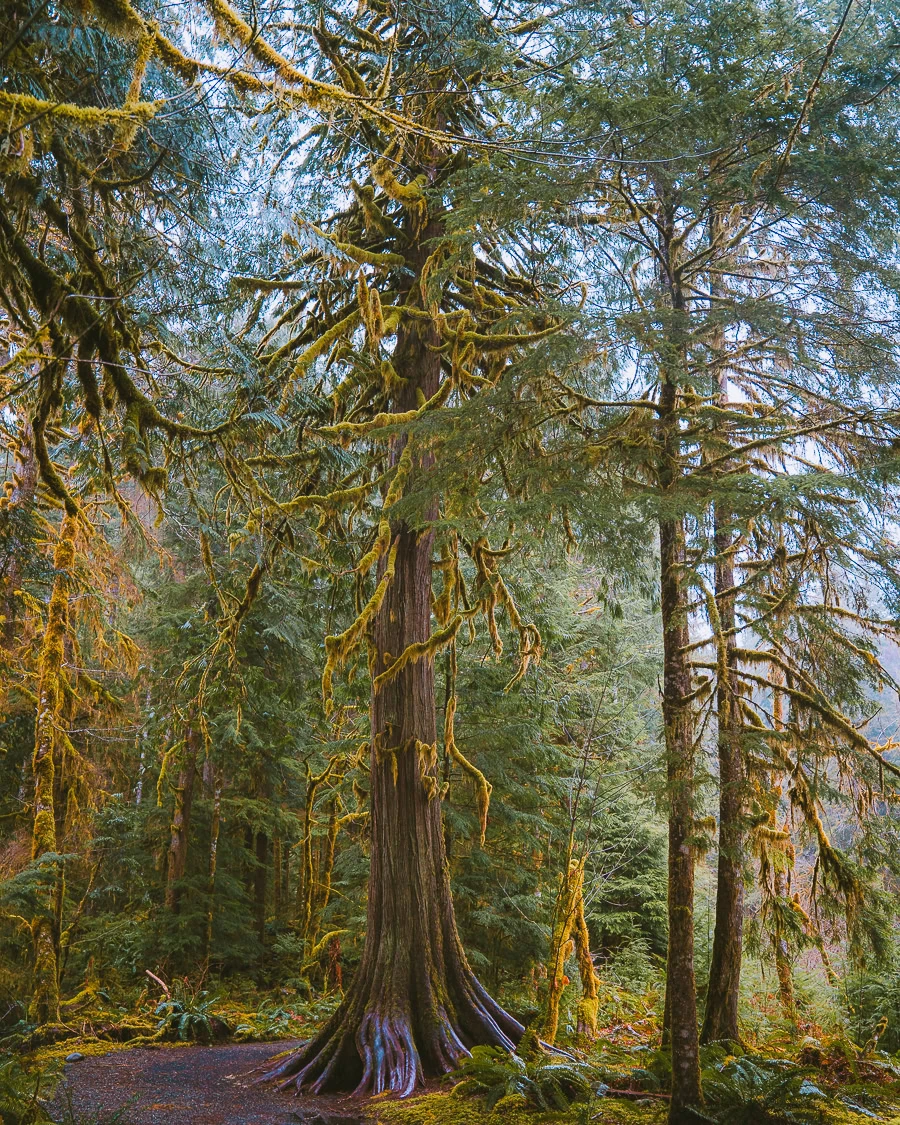
The Olympic Peninsula is a year-round destination, but the best time to visit depends on the activities you prefer and what you want to experience.
Spring (March to May): Spring is a lovely time to visit the Olympic Peninsula, as wildflowers begin to bloom and the waterfalls are at their peak thanks to the snowmelt. The weather can be unpredictable with rain, but the crowds are fewer, making it a peaceful time to explore. It’s a great time for rainforest spring hikes and seeing wildlife.
Summer (June to August): This is the most popular time to visit, with warm, dry weather ideal for hiking and beachcombing. Trails like Hurricane Hill and Mount Storm King are more accessible, and views of the stunning coastline are clearer. However, you’ll find higher prices and larger crowds, especially in July and August.
Fall (September to November): Fall features cooler temperatures and fewer crowds, making it a great time to visit. The vibrant autumn colors, especially around Lake Crescent and the forests, make for stunning fall hikes. Rain is more frequent, but the moody weather enhances the beauty of the rainforests and beaches.
Winter (December to February): Expect heavy rain and snow at this time of year, making some trails and roads impassable. While this may not be the best time for hiking, it’s perfect for storm-watching on the coast or a cozy retreat at a lodge. It’s also the quietest season for visitors.
Tips for the Ultimate Olympic Peninsula, Washington, Road Trip

Planning is key, so here are some of the top tips to know before your road trips begin.
- Pack for Rain: The Olympic Peninsula is known for its rain, especially in the Hoh Rainforest and coastal areas. Waterproof clothing will keep you comfy on your trip.
- Layer Your Clothing: Temperatures can vary greatly, especially if you’re hiking to higher elevations like Hurricane Ridge. Bring layers so you can adapt to changing weather conditions.
- Book Accommodations in Advance: Summer and holiday weekends are busy, with accommodations filling up quickly. Reserve your lodging or campsite early, especially if you’re staying near popular spots like Port Angeles or Forks.
- Start Early: To avoid crowds at popular hiking trails like Sol Duc Falls and Hurricane Hill, plan to hit the trailheads early in the morning.
- Bring Your Own Food and Water: Some areas, especially within Olympic National Park, have limited food options. Pack a cooler with snacks, meals, and plenty of water for the day.
- Respect Wildlife: Keep wildlife safety in mind when wandering through the area.
- Check Road and Trail Conditions: Some roads and trails might be closed due to snow or maintenance. Always check current conditions before your trip on the National Park Service website or the Olympic National Park website.
- Carry Cash: Some remote areas may not accept credit cards, so it’s useful to carry cash for entry fees, small businesses, or local stores.
- Respect Leave No Trace Principles.: Pack out everything you bring, including trash, and leave nature undisturbed. Stick to the designated trails to help preserve the ecosystem.
What to Pack for Your Olympic Peninsula Trip
- Sunscreen: Even if the sun isn’t out, you still need that UV protection. >Buy Sunscreen
- Sunglasses: Protect your eyes from the glare with some cute sunglasses. >Check Out These Sunglasses
- Hiking Boots/Shoes: Hitting your toes on a rock is no joke, so hiking shoes will keep you from feeling like your toes will fall off. >Check Out These Hiking Shoes
- Hiking Socks: The right socks help prevent blisters and sore feet. >Buy Hiking Socks
- Refillable Water Bottle: A Hydroflask or something similar will keep you hydrated when water isn’t readily available. >Check Prices Now
- Snacks: Keep snacks on hand to keep your energy levels up. >These Bars are Great for Hiking
- First Aid Kit: This is one of the first things you should get for any hiking trip. >Buy This First Aid Kit Here
- Day Pack: Keep all your stuff in one easy-to-carry place. >Buy This Backpack
- Hiking Pants: Aim for comfort and durability during your treks. Leggings are great, but not if it’s raining. >Click Here For Great Hiking Pants
- Breathable Layers: Make sure to wear something breathable and easy to layer when hiking. Cotton is great for sweat control. >Check Out This Shirt Here
- Jacket/Raincoat: It can get pretty chilly all year long, so bring a jacket. >Buy A Jacket
- National Park Pass: You’ll never regret getting a year-long America The Beautiful Pass. >Get It Here
- Map or GPS device: A map or GPS device is essential since cell service is spotty in some areas. You can also pick up maps at a ranger station. >Check This One
Claim your FREE Hiking Checklist
Ready to start hiking? Grab my free hiking checklist and never forget anything at home!
Tours At Olympic National Park
Best Places to Stay on the Olympic Peninsula

When visiting the Olympic Peninsula, there are plenty of towns that make excellent bases for exploring the area’s natural beauty, depending on which attractions you want to prioritize.
Port Angeles
Port Angeles is one of the largest towns on the Olympic Peninsula and a great hub for exploring Hurricane Ridge, Lake Crescent, and Sol Duc Falls. It has a wide variety of accommodation options, restaurants, and easy access to the Olympic National Park. Plus, the ferry ride to Victoria, BC, departs from here if you’re up for a side trip.
Luxury | The Victorian Spa Retreat
The Victorian Spa Retreat in Port Angeles is a luxurious, classic haven with added modern comforts. This charming spa retreat offers rejuvenating treatments in a serene, beautifully restored Victorian setting, perfect for relaxation after a day of exploring the Olympic Peninsula. >Click here to check pricing
Mid-range | Salt and Cedar Bed and Breakfast
This cozy, rustic retreat on the Olympic Peninsula offers charming rooms, homemade breakfasts, and warm hospitality. The tranquil setting and personalized touches make it perfect for a relaxing getaway. >Click here to check pricing
Forks
Famous for its connection to the “Twilight” series, Forks is the perfect place to stay to explore the Hoh Rain forest and Rialto Beach. It’s a quiet, small town with a few lodging options, ideal for travelers wanting to escape into nature. It’s also near La Push, where you’ll find the Quileute reservation and some gorgeous beaches and tide pools (no giant wolves, though, sorry!)
Mid-range | Woodland Inns
Experience a comfortable, rustic retreat in the heart of the Pacific Northwest. Surrounded by lush forest, it’s a perfect base for exploring the Hoh Rainforest and other nearby attractions in Olympic National Park. >Click to check pricing here
Budget | The Bogi Bear Inn
The Bogi Bear Inn offers a cozy, cabin-style stay amidst the beauty of the Olympic Peninsula. The peaceful setting makes it a lovely spot for exploring the nearby attractions and all that Forks has to offer. >Click to check pricing here
Port Townsend
This historic town is known for its Victorian architecture and waterfront charm. Port Townsend is a great choice for travelers looking for a cultural experience along with outdoor adventures. It’s close to hiking spots like Mount Townsend and offers plenty of cafes, galleries, and cozy B&Bs.
Mid-range | The Bishop Hotel
The Bishop Hotel in Port Townsend is a charming, historic boutique hotel that combines Victorian elegance with modern comfort. Located in the heart of downtown, it’s perfect for exploring the town’s waterfront, shops, and nearby attractions. Each suite is uniquely decorated for the ultimate cozy vibe. >Click here to check pricing
Mid-range | The Swan Hotel
This quaint waterfront hotel in Port Townsend boasts cozy rooms and charming cottages with beautiful views of the marina. Its convenient location makes exploring Port Townsend’s historic district, nearby restaurants, and local attractions a breeze. >Click here to check pricing
FAQs About Visiting the Olympic Peninsula

Check out these answers to some commonly asked questions to soothe any lingering concerns.
How Many Days Do I Need in the Olympic Peninsula?
To fully experience the Olympic Peninsula’s diverse landscapes, you’ll ideally need 3 to 5 days. This allows time for hiking, exploring coastal gems, and visiting iconic spots without feeling rushed. A weekend trip is doable but limited.
How Long Does it Take to Drive Around the Olympic Peninsula?
Driving the loop around the Olympic Peninsula via Highway 101 takes about 8 to 9 hours without stops, covering roughly 300 miles. However, with the area’s numerous scenic viewpoints, hiking trails, and coastal attractions, plan for at least a couple of days to fully enjoy the journey.
Wrapping Up Your Olympic Peninsula Road Trip

An Olympic Peninsula road trip is an incredible journey through diverse landscapes, from misty beaches to alpine ridges and ancient rainforests. Whether you’re hiking scenic trails, exploring coastal gems like Rialto Beach, or soaking in the serenity of Lake Crescent, the peninsula delivers adventure and tranquility in equal measure.
With so much natural beauty packed into one region, this road trip will leave you with unforgettable memories and a lingering appreciation for the Pacific Northwest. So, pack your bags, hit the road, and discover the wild and wonderful Olympic Peninsula for yourself — it’s an adventure you won’t regret.
PS: Check out this Washington road trip itinerary if you want to explore the state for even longer!

